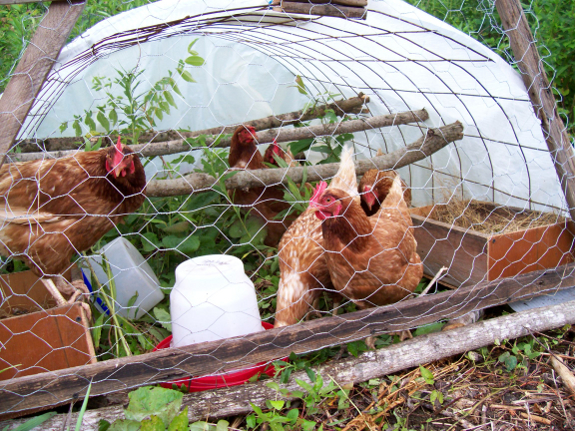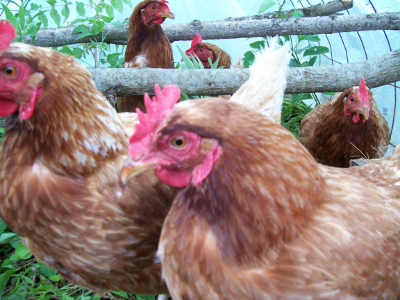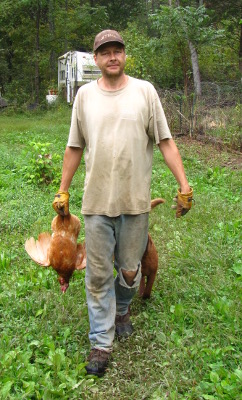
Culling old hens

Tuesday was a
bittersweet day --- we killed the two hens surviving from our initial
flock of Golden Comets, purchased as adults in 2007. The photo
above shows some of those then-young ladies in an early chicken tractor
that July.
 We started with twenty hens,
which was a crazy number --- we had moved to the farm not long before
and soon the few local people we knew didn't even want free eggs anymore. Two hens
died of heat exhaustion when their old fashioned waterer spilled (the
impetus for Mark's chicken waterer invention), and we gave
twelve away to my father to slim down the flock even more.
We started with twenty hens,
which was a crazy number --- we had moved to the farm not long before
and soon the few local people we knew didn't even want free eggs anymore. Two hens
died of heat exhaustion when their old fashioned waterer spilled (the
impetus for Mark's chicken waterer invention), and we gave
twelve away to my father to slim down the flock even more.
Slowly, four more
chickens bit the dust. One was a casualty of us thinking we could
keep a rooster in a chicken tractor --- he overmated our hens
mercilessly and one girl was too injured to survive. Another died
last winter when her old bones could no longer take the cold. And
to be honest I can't remember what happened to the other two.
 I've written before about why
you can't expect to raise chickens for eggs and not get your hands
bloody, but I guess
I just didn't feel like my words applied to these old girls. They
were our wiliest hens, the first to come running when I called them to
a new pasture (and the first to find a hole in the fence.) When
people came to interview us about our chicken waterer, all I had to do
was tap the chicken nipples and our old Golden Comets would obediently
trot over and drink, whether they were thirsty or not.
I've written before about why
you can't expect to raise chickens for eggs and not get your hands
bloody, but I guess
I just didn't feel like my words applied to these old girls. They
were our wiliest hens, the first to come running when I called them to
a new pasture (and the first to find a hole in the fence.) When
people came to interview us about our chicken waterer, all I had to do
was tap the chicken nipples and our old Golden Comets would obediently
trot over and drink, whether they were thirsty or not.
But they were also
laying very few eggs any more, at least after spring ended. Last
winter, we started having to buy eggs from the store to round out our
diet, and the old hens never really picked up steam even when warm
weather returned.
You just can't expect a
four and a half year old hen to repay your expenses of feeding her over
a hundred pounds of feed (at least $30) per year. And you also
have to figure in the wear and tear on the pasture (worst in winter)
and the fact that your old hens are  probably head of the flock and
get to eat the best food, leaving your better layers malnourished while
their elders get fat. So we bit the bullet and turned them into
dinner this week, along with a one-year-younger Golden Comet who was
also past her prime.
probably head of the flock and
get to eat the best food, leaving your better layers malnourished while
their elders get fat. So we bit the bullet and turned them into
dinner this week, along with a one-year-younger Golden Comet who was
also past her prime.
I'd gotten used to
slaughtering three month old broilers --- we've already processed 21
this year, and after the first few, I started enjoying chicken killing
day as a break from the hard work of the garden. But those
broilers were raised from birth with dinner in mind and they hadn't
really grown into their personalities yet. The Golden Comets felt
different. Even though we hadn't named them, they almost felt
like pets.
And yet, I can almost
feel the pasture breathe a sigh of relief. Three fewer chickens
to scratch up the turf! And this year's pullets and cockerel seem
thrilled to have moved up a notch on the totem pole --- access to
scraps! It isn't always easy to do the right thing, but I'm glad
we didn't let our farm turn into a rest home for chickens.
Want more in-depth information? Browse through our books.
Or explore more posts by date or by subject.
About us: Anna Hess and Mark Hamilton spent over a decade living self-sufficiently in the mountains of Virginia before moving north to start over from scratch in the foothills of Ohio. They've experimented with permaculture, no-till gardening, trailersteading, home-based microbusinesses and much more, writing about their adventures in both blogs and books.
Want to be notified when new comments are posted on this page? Click on the RSS button after you add a comment to subscribe to the comment feed, or simply check the box beside "email replies to me" while writing your comment.

Top 3 things you have blogged about that help me in my daily life. 1. Homemade dog food. 2. Gardening tips. 2. Chickens, chickens, chickens.
Kathleen --- So glad I could help!
Kevin --- I know exactly what you mean! It's so easy to put the difficult decisions off far longer than you should. That said, stay tuned --- I've learned a new method of cooking old chickens that's my favorite yet.